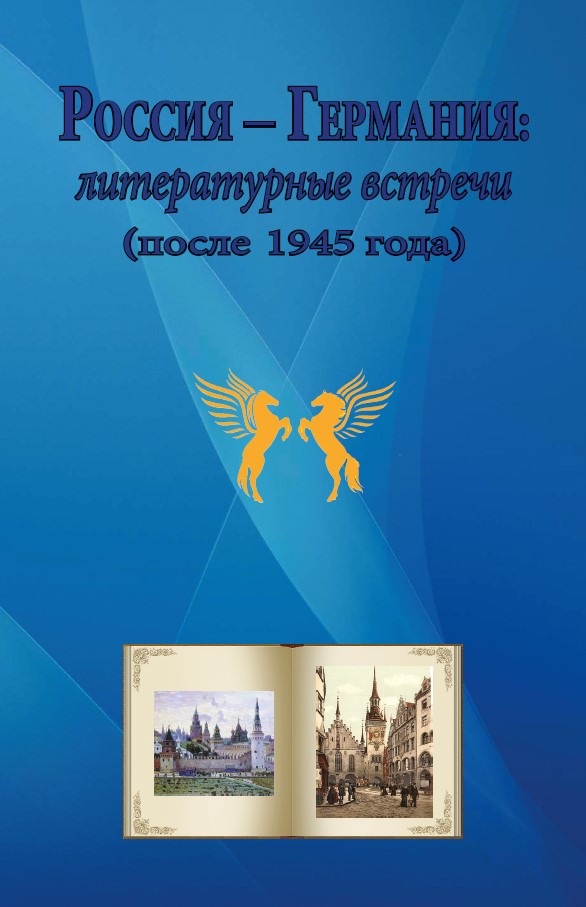Information about editors:
Tamara V. Kudryavtseva, DSc in Philology, Director of Research, А.M. Gorky Institute of World Literature of the Russian Academy of Sciences, Povarskaya 25 а, 121069 Moscow, Russia.
ORCID ID: https://orcid.org/0000-0002-8279-8639
E-mail:
Alla A. Strelnikova, PhD in Philology, Associate Professor at the Department of History of Foreign Literatures, Moscow Region State University, Vera Voloshina St., 24, 141014 Mytischi, Moscow region, Russia; Senior Researcher, А.M. Gorky Institute of World Literature of the Russian Academy of Sciences, Povarskaya 25 a, 121069 Moscow, Russia.
ORCID ID: https://orcid.org/0000-0002-2887-7678
E-mail:
Abstract:
This book continues to introduce the reader to Russian-German literary relations in the 20th century. The results of the first stage of the research were presented in the collective work Russia — Germany: Literary Encounters (1918–1945) published by A.M. Gorky Institute of World Literature of the Russian Academy of Sciences in 2017 with the financial support of the Russian Foundation for Basic Research grant no. № 17-04-16003. The present study analyzes mutual influences, intersections, typological similarities, receptive projections and imagological concepts occurring at the borders of the cultural spaces of Germany and Russia in the second half of the 20th and the first third of the 21st century. The aim of this work is to complement or amend the existing knowledge of the literary and cultural interactions of the two countries after 1945. Like in the first book, special attention is paid to identifying the mechanisms of the perception of a foreign literature in the context of national regulatory language usage paradigm. The book studies direct and indirect contacts between the two literatures and helps isolate single elements of critical reflection in the field of meaning-making and on the level of the formation of motific, aesthetic and stylistic models of the text. This work, which includes the articles written by thirty Russian researches, is of theoretical and practical value and appeals to specialists in comparative studies, intercultural communication, history of German and Russian literature, as well as to a wide audience interested in these problems.
Кeywords: Russia, Germany, literary contacts, comparative studies, imagology, intercultural communication.
CONTENTS
From the editorial board
Тamara Kudryavtseva, Alexandr Gugnin. German–Russian Literary Dialogue after 1945
Part I.
RUSSIA THROUGH THE EYES OF GERMAN WRITERS. GERMANY THROUGH THE EYES OF RUSSIAN WRITERS
Tatiana Sharypina. The Tradition of German Anti–Fascist Journalism of 1941–1945 and the Formation of East German Literature
Tamara Kudryavtseva. Vladimir Mayakovsky in Postwar Germany: Traditions of Perception
Аnna Dobryashkina. “For them the war had not ended”1: the Culture of Remembrance in Germany in Günter Grass’ Novella Crabwalk
Galina Kuchumova. Deconstruction of the Myth of Big Brother in the Novels of Thomas Brussig
Tatiana Andreiushkina. “Against the Symmetrical World”: Volker Braun and Russia
Stephan Lipke. A Russian Trace in Ulla Hahn’s Poem My Father
Aleksandra Eliseeva. Germanomania as an Opposition Strategy in Inga Petkevich’s Novel Lament for the Red Bitch
Aleksandra Eliseeva. Border Discourse in Wolfgang Büscher’s Berlin – Moscow. Journey on Foot (Berlin – Moskau: Eine Reise zu Fuß, 2003)
Tamara Kudryavtseva. With Love for Russia: Heinz Piontek, Karl Wolff, Leonhard Kossuth
Part II.
THE “RUSSIAN” GERMANY AND THE “GERMAN” RUSSIA: LITERARY CONTACTS
Alla Strelnikova. “...We are the Ones who Built the First Bridge”: B. Kellermann’s Connections with the USSR after World War II
Igor Ebanoidze. “...When the Russians Came”: Soviet Contacts of Hermann Kasack
Natalia Bakshi. Russian–German Cultural Transfer (the Case of the Publishing House “Suhrkamp”)
Evgeny Zatshevsky. Wolfgang Koeppen in the USSR
Galina Vorontsova. M.A. Sholokhov`s Visits to Germany
Elena Zeifert. Prose of the Russian Germans in the Second Half of the 20th and the Beginning of the 21st Century
Aleksandra Eliseeva. Identity Discourse in German Prose by Authors from the USSR
Part III.
ARTISTIC PRACTICE: CONVERGENCES, INTERSECTIONS AND PARALLELS
Liudmila Fuchs-Shamanskaya. The Perception of Yevgeny Baratynsky’s Works in Post-War Germany (Based on Christoph Meckel’s Novel A Message for Baratynsky)
Igor Ebanoidze. “Brothers in Anguish of Soul...”: The Stature of Anton Chekhov by Thomas Mann as an Existential Experience of Self–Justification
Alexandr Gugnin. Soviet Literary Tradition in the Dramas by Heiner Müller (on the Example of Cement and Volokolamsk Highway)
Elena Astashchenko. Stefan Heym: a Dialogue with Russia
Dmitrii Chugunov. A Semantic Consonance in Writings by Alexandr Solzhenitsyn and Krista Wolf
Mikhail Pavlovets. Russian Uncensored Poetry and German Concretism: Between Creative Reception and Reflection
Elena Zeifert. The Schwank of the Russian Germans: Development of the German Genre (Based on the Example of Edmund Günther`s work)
Veronika Zuseva-Özkan. Heinrich Heine and Timur Kibirov: the Formula of Similarity
Part IV .
UNDERSTANDING THE OTHER — A SCIENTIFIC PERSPECTIVE
Elena Takho-Godi, Petr Rezvykh. Aleksei Losev and Bruno Snell: a Dialogue over the Boundaries
Lidia Sazonova. A.V. Mikhailov at International Congresses: Scientific Reports and Personal Meetings
Natalia Pestova. “The Never–Fading Phenomenon of Expressionism”: Russian Studies of Expressionism in the 21st Century
Tamara Kudryavtseva. Grimaces of History: Personality and Works of Paul Ernst in Soviet and Post–Soviet Academic Discourse
Vladimir Koljazin. “My” Heiner Müller
Part V.
FOREIGN CULTURE IN THE OPTICS OF TRANSLATION
Anton Chorny. Georg Heym in Russia: a Hundred Years of Translations and Studies
Ekaterina Khilo. Sergei Yesenin: Translations and Editions in Germany
Aleksandr Erokhin. Russian and Soviet Poetry in Translations by Authors of the Saxon Poetic School
Tatiana Andreuishkina. Russian Poetry in Museum der modernen Poesie (1960/2002) by Hans Magnus Enzensberger: Translation as “a Dialect of the Universal Language of Poetry”
Nikon Kovalev. “Dunkelhellila” (Dark Light Violet) vs “Grayish Brown Purple”: Gottfried Benn’s Poetry in Russian Translations
Instead of a Conclusion. The Perspectives of the Study of Russian-German Literary Contacts (by the editorial board)
Index of Names



